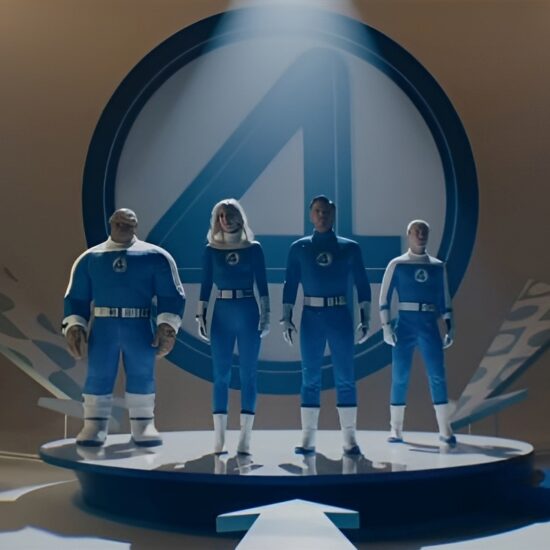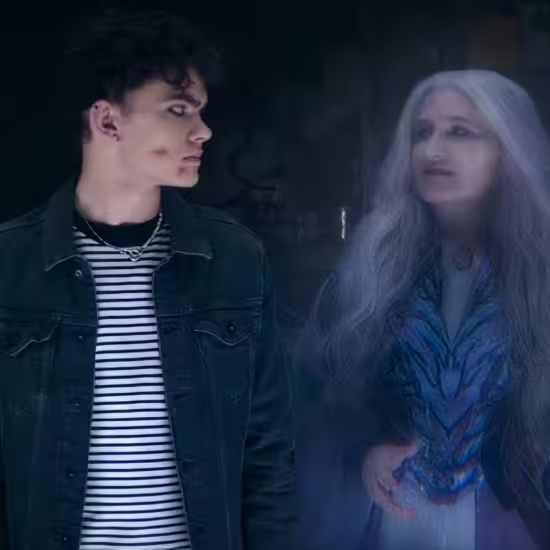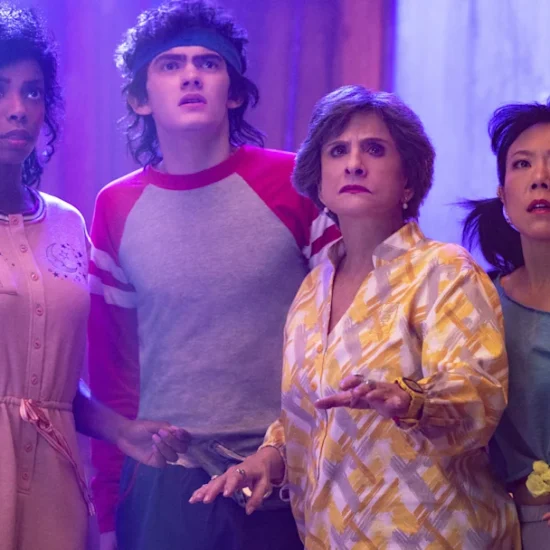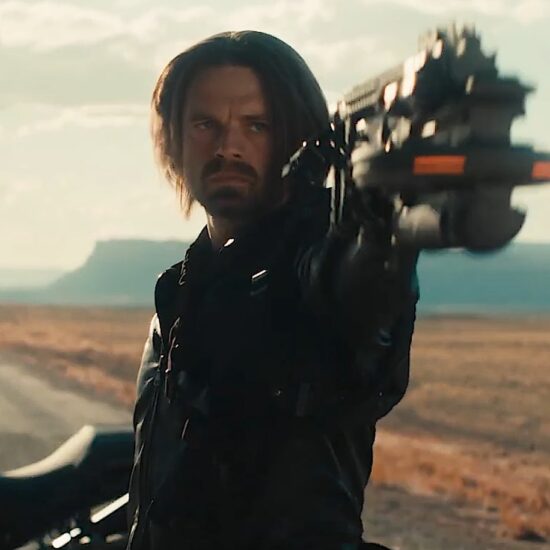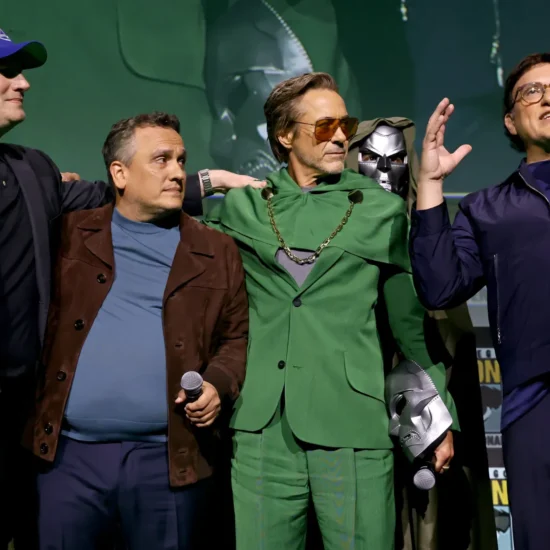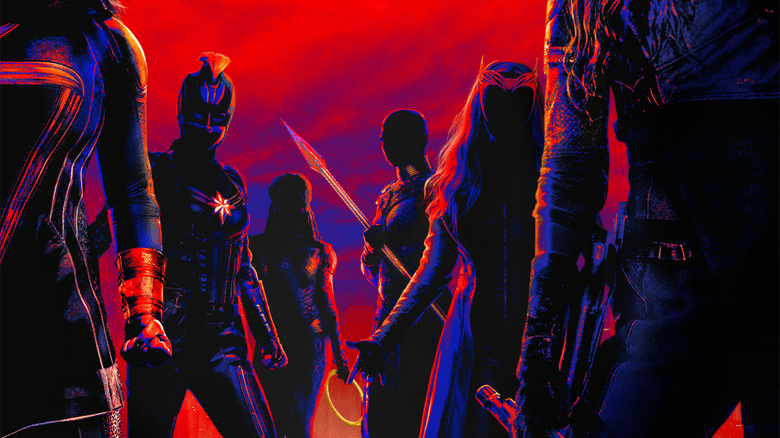
The Women of Marvel are coming together in a brand-new documentary series now streaming on Disney+, MPower. The four-part series sheds light on some beloved Marvel Super Heroes alongside the actors that play them and their character’s long-lasting legacy well beyond the movies and TV shows featuring them. Wondering exactly what Elizabeth Olsen has to say about her personal and emotional connection to The Scarlet Witch? MPower dives into all of that and more.
The series is produced by Cinestar Pictures, spearheaded by a familiar MCU name attached to the production company, Zoe Saldaña. Zoe, along with her sisters Mariel and Cisely, run Cinestar Pictures and all served as Executive Producers for MPower. Following the show’s launch, Marvel.com hopped on a video chat with Mariel and Cisley to talk through the episodes, dive further into the characters, and discuss what it’s like to work together as sisters and be a Woman of Marvel.
Marvel.com: I also come from a family of three sisters, so I am truly obsessed with your sisterly dynamic. I want to talk about what it is like working as a unit, as a trio, and who does what in bringing something like this to life.
Mariel Saldaña: When it comes to MPower, our processes — sharing the responsibility of bringing the show to life was very rewarding and challenging. We have to all see the vision and be equally as passionate about something moving forward. With this one, it was a no-brainer.
I think when [Executive Producer] Justin Hochberg came to us with an idea: he wanted to make a show for his teenage daughter about icons that she could look up to in the future. I think that resonated so much with us, that we took it and ran with it.
Cisely Saldaña: As executives, everybody brings their own unique strengths and skills to the creation and creative process. For example, Zoe — she’s such a closer in the room and a force to be dealt with.
And then, Mariel excels in story and character development, and Zoe and I refer to her as the heartbeat of Cinestar. I am more business-oriented, constantly seeking the next opportunities for us, making sure that we’re always in front of the right people, the decision-makers.
Working together just requires exceptional communication and a shared vision. But, on weekends, we’re sisters, we’re mothers, we’re daughters. We’re constantly trying to invade each other’s privacy. We are loud and opinionated with one another — you know, sisters.
Marvel.com: There are only four episodes of MPower, but still dozens of different characters throughout. How did you pick and choose exactly which characters you were shining a light on?
Mariel Saldaña: The Marvel characters represent such important themes and values in their movies, so it was kind of trying to marry that with also the ladies that play these characters — playing that character, how they resonate with you, and eventually, how it’s going to resonate with everybody in the world that’s going to see it.
The themes were right there in our faces. Like, for instance, for the ladies in Black Panther, it was sisterhood, power of community, leadership, and visibility. All that is important. With Captain Marvel, it’s courage and honor. Realizing the power within was so very important because she spoke so much about that.
The same thing with Gamora. Sibling rivalry was a big thing. I know because when Zoe was filming it, we would talk about the scenes that she was shooting with Nebula. It was always a conversation, in the sense that it’s not rivalry with peers or anything like that. It’s a rivalry with a sibling, and what does that look like? And it could be ugly. And I love that we got to cover that.
Ooh, Scarlet Witch! I remember just getting goosebumps every single time we were editing that, or we were giving notes on that episode. The aspect of mental health, the aspect of grief…the fact that we can sit there and talk about these things, these themes, they’re not taboo.
Cisely Saldaña: I think that it just really gives everybody an opportunity to identify, to see which episode they identify more.
Marvel.com: Not only are we talking about so many Marvel Heroes but also just so many creatives behind the scenes. How did you bring everyone together for the series?
Cisely Saldaña: The direct answer to that is it was hard. It was hard. Marvel had several movies filming in different locations, so we had to bring our production to London. We also went to Atlanta. We shot here in Los Angeles. We covered some ground in New York. We were quite worldly with this.
The collaboration was so rewarding. It was beautiful, our production working closely with every leading, powerful lady and their characters, to help tell the right story and make sure the audience connects with it. I think that everyone did an amazing job of humanizing their characters.
But it was very challenging to figure out schedules. We were in London when we had to shoot the Captain Marvel episode because that’s where production was at the time. So, we literally had to chase the talent, and we had to go where they were.
Mariel Saldaña: But to be honest with you, we were fans. Sometimes, there were interviews where all of us would get goosebumps. We were just so grateful for everybody’s time. Everyone was so generous with us with their time, and I think it bled through the episodes. You can tell that they were really putting their passion and heart out for this.
Marvel.com: The animation in the series is phenomenal. Did you assist, at all, in the animation process?
Mariel Saldaña: We had a few animations pitch us ideas and we gravitated towards Future Power Station. They were phenomenal. They were super collaborative. I feel like they went above and beyond because when we would pick what stories we wanted to be animated, we didn’t want a literal depiction of the story. We wanted you to interpret it. They delivered every time.
Cisely Saldaña: Every single time.
Mariel Saldaña: That’s exactly the type of texture that we wanted.
Cisely Saldaña: Every episode has its own style. They catered to every episode to the story. The Black Panther episode is very different than the Gamora episode, very different from the Scarlet Witch episode. I mean, they were all very independent from one another.
Marvel.com: I love that each episode ends with a fan talking about their own personal connection. Can you talk about the far-reaching impact some of these characters have on fans, and especially just incorporating that fan into each episode?
Cisely Saldaña: To not honor the fans in a show like this is a big disservice. The reason why fans are so passionate is that they relate to these characters. And sometimes they’re inspired to do something in their own communities.
It’s important to really focus, highlight, and celebrate those moments. It’s not just about the characters on screen. Let’s talk about that domino effect. How did it really impact that fan’s life, what they did, and what they were able to do in their community because of that inspiration? I mean, that speaks volumes.
Isn’t that what, ultimately, you want, not only to be inspired — you want to continue inspiring people to be actionable in their own lives, in their own communities. So, we felt that it was important. We couldn’t tell this story without highlighting the importance of the impact of the fans and what they’ve done with that knowledge, with that inspiration, what they’ve done with it in their community, in their lives, and with their charities.
Marvel.com: Obviously, you have a firsthand connection to the MCU, with Zoe as Gamora. But beyond that, what do some of these characters mean to you?
Mariel Saldaña: So, I mean, personally, I like Gamora. Not that I’m biased or anything.
No, but Gamora, I think, if you really think about it, people call her the deadliest assassin, but, to me, what resonated is how her journey is a journey of self-discovery, growth, and redemption. There’s that word again. For some reason, I think what resonated with me is the fact that — the redemption part of it. That’s where her sense of justice comes from.
With Captain Marvel, it was her honor and the fact that she discovered the power within. You can show the themes that really resonated with us and beyond by watching the episodes. The mental health, with Scarlet Witch, I mean, obviously, that’s something that was close to our heart because it’s just certain taboos that are not spoken about.
Also, Elizabeth Olsen just blew us away with the openness and security, and safety with that she spoke. You gravitate towards that. That’s why she’s such an amazing Scarlet Witch. Because that’s why she does it. I think they all, in their own way, resonate with us.
Marvel.com: Now, just speaking of Gamora, I will say Nebula and Gamora is one of my favorite relationships in the MCU because, like I said, I have sisters. I see it. I completely get it on screen. Are you ever watching Nebula with Gamora, and think, hmm, this is a little familiar? Like, we’ve had this same interaction before, too.
Cisely Saldaña: Funny enough, I think that in Gamora’s episode, Zoe jokes a little bit about it, too. Yeah, there are moments where they feel a little more nostalgic than others, when you’re like, oh, that’s exactly how I wanted to fight you when we were 13. But that’s something in the past, and a feeling that you can tap into and revisit. And then we all have a laugh over rosé because we’re not there anymore.
Once you get older, you prioritize. You get calmer. It’s almost as if that frontal lobe fully develops, and then you just have a complete understanding of what life is and how to navigate that, right? But you don’t have those tools when you’re younger. Hence, all the aggression and the catfights.
And, but, yes, sometimes when we were watching something and it reminds us, we certainly have a good laugh because that’s not where we are anymore.
Marvel.com: With MPower, both of you are now a Woman of Marvel because you’ve contributed to the overall Marvel Cinematic Universe. What does that mean to you? What kind of legacy does this leave now?
Cisely Saldaña: Oh, man. So, this is very loaded, and I think that it carries a lot of responsibility. Being a Woman of Marvel is an incredible honor and privilege. It means being part of a community of talented, passionate, creative individuals who are dedicated to telling compelling stories and characters. It also means being part of a legacy of trailblazing women who have made their mark in the industry and paved the way for future generations.
I think Cinestar is very, very proud to be a part of a company that values diversity, inclusivity, and representation, both on and off-screen. That has been our mission since we became a company. I believe that our work not only entertains and inspires but also has the power to make a positive impact on the world.
In terms of the legacy that it leaves behind, I think we truly hope that it serves as a source of inspiration and empowerment for young girls and women everywhere. We hope that it shows them that they, too, can pursue their dreams and make a difference in the world, regardless of their gender and background. We also hope that this continues to encourage more women to enter the industry.
Mariel Saldaña: I think the most important thing for us is, oh, we didn’t really realize it at first. Because, initially, when we read the question, we were like, oh, my God. And then, afterward, you’re like, oh, wow.
Cisely Saldaña: Honestly, right. We didn’t see ourselves that way.
Mariel Saldaña: It’s so humbling. But I think it’s just the same thing as like Cisley saying, it’s like now we have our voices for good. Because when the show first came out, I had my two daughters sitting with me, watching it. And then I was rushing them off to school, absolutely.
But just that feeling, and that’s what Marvel gets all the time, in the sense that they are leading through example, leading all these fans, to be like, OK, if you see yourself reflected at you, it’s good.
Cisely Saldaña: When Mariel and I read that question, automatically, we were like, “oh, I think that this is a question for Zoe.” We just didn’t see ourselves in it. And then what perfect gift than to have your own show playing in the background and being like, no, they did ask us. Like, we are Women of Marvel. We didn’t realize it. We didn’t notice it.
And then, once we stepped into that question, right, it was like, wait a minute now. This is a big responsibility. We must make sure that we’re saying the right thing because this is insane. Oh, my God, we’re part of the women of Marvel now. This is it.
Anyways, we didn’t see ourselves in that. But we also are learning, ourselves, to start seeing ourselves because not only are we helping open more doors and put more shows and movies with women and people of color that also look like us, but we also must practice that, as well. So that was– not only was it a challenging question for us, but once we understood the assignment, we absorbed it and leaned in. And, yeah, hell yeah, we’re now part of the Women of Marvel. That’s insane.
MPower is directed by Quinn Wilson, and executive produced by Victoria Alonso, Mark Herzog, Andie Beckerman, Zoe Saldaña, Cisely Saldaña, Mariel Saldaña, Justin W. Hochberg, Lauren Moore Morden, Jeff Redmond, Sarah Girgis; Lauren Goralski serves as co-producer. The series comes from production companies Herzog & Co., Cinestar Pictures, and Just Entertainment.
The 4-part original series is now streaming exclusively on Disney+!









